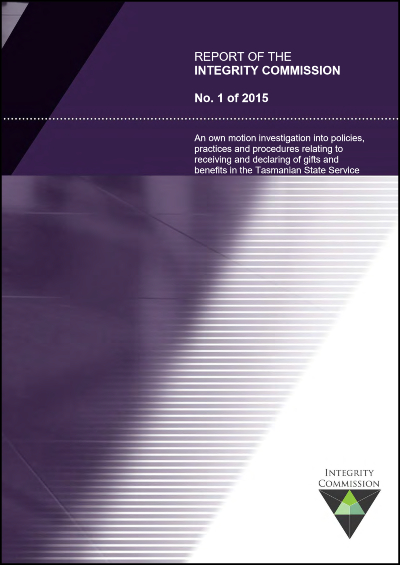Executive summary
This is a report of an own motion investigation undertaken by the Integrity Commission (the Commission) pursuant to s 45(1)(d) of the Integrity Commission Act 2009 (the Act). The investigation, titled Operation Kilo, was into Tasmanian State Service policies, practices and procedures in relation to gifts and benefits. The receipt of gifts and benefits is an area of high misconduct risk. The motivation for this investigation stemmed from information that had come to the Commission’s attention during other investigations, and from training it had delivered which indicated that this may be a problem area for State Service agencies.
As part of Operation Kilo, the Commission:
- collected the current gift policies of 12 State Service agencies;
- collected gift registers covering the period 1 July 2011 to 30 June 2014 from 12 State Service agencies;
- conducted an audit of the policies and registers of those 12 State Service agencies;
- collected and collated good practice materials from across all Australian jurisdictions;
- issued 13 notices to produce information, pursuant to s 47(1) of the Act, including nine to private companies to produce gift records covering the period 1 July 2011 to 30 June 2014;
- issued seven notices to attend to give evidence and conducted seven interviews under notice, pursuant to s 47(1)(b) of the Act; and
- sent 14 letters requesting information to private companies.
This report
This report covers five main areas from which Tasmanian State Service gifts and benefits management practices may be derived. Those areas are:
- legislation;
- regulations;
- Employment Directions;
- Treasurer’s Instructions; and
- good practice.
Findings
Appropriate management of offers of gifts and benefits is essential to maintaining the actual and perceived integrity of the Tasmanian State Service. Through this investigation, the Commission has identified a concerning complacency among agencies about this issue. Almost without exception, the Commission’s request for gifts and benefits policies and records triggered a flurry of activity within agencies. Many agencies advised that they had a new gifts policy – or were in the process of drafting one. Some agencies took several months to locate and send the requested information to the Commission.
Another matter of concern was the lack of understanding of the relationship between gifts and conflicts of interest. None of the agency policies explained this relationship satisfactorily – indeed, only two of the policies explained it at all. Even where an agency’s policy did provide some explanation of conflicts of interest, the gifts that had been approved by the agency demonstrated either a failure to understand the policy, or a failure to apply it.
The finding of Operation Kilo indicates that there is a fundamental misunderstanding about gifts and benefits and how they should be appropriately managed in State Service agencies. Of particular concern is that this is occurring in high risk areas in some agencies, such as asset management and procurement. Further, records produced by private companies indicate that by no means are all gifts and benefits received by state servants being declared. It is clear that agencies are not providing their staff with enough (or any) support, guidance and training in these matters. As a result, legislation, regulations, mandatory State Service policies, agency policies, and good practice are seldom adhered to by staff, management and agencies.
Operation Kilo has revealed a systemic issue within the Tasmanian State Service. The State Service appears to be at risk of developing a culture of entitlement in relation to receiving gifts and benefits – that employees are owed these ‘rewards’ because of their ‘hard work’. There is a lack of understanding of appropriate standards, and of the risks that arise from accepting such rewards. Particularly at the lower end of the scale, accepting certain benefits is seen as just a ‘way of doing business’. Many State Service agencies appear to be under the impression (or at least give the impression to their staff) that as long as they are declared, most – if not all – gifts are acceptable. Yet at the same time, it appears that only a small percentage of received gifts are being declared. There is evidence of a reluctance on the part of agency management, at least prior to this investigation, to enforce change, or even to enforce the agency’s own guidelines.
It seems unlikely that the Tasmanian community would view this situation as satisfactory – at the very least from a governance or public confidence in the public sector perspective. It is also important to consider how it would be viewed by those who seek to do business with the State Government. They too would be rightly concerned about the risk that gifts and benefits being given by some businesses could be having an unfair influence on purchasing decisions.
In response to the investigation, State Service agencies have embarked on a process of reviewing the current policy framework with a view to implementing a whole of government policy in relation to the receipt of gifts and benefits. In the Commission’s view, a ‘no gifts’ policy (subject to very limited exceptions such as token items) is the best policy for employees, agencies, and the public interest. Such a policy is consistent with good practice initiatives examined by the Commission in its in-depth research conducted for the investigation. However, this is not the preferred position of the agencies.
It should be noted that the case studies in the report were not included to single out any particular employee or agency, nor should it be presumed that the conduct described is or was misconduct. The case studies have been included to demonstrate the practical risks that the inadequate policy framework in the State Service currently poses to agencies, to employees, and to the public interest.
The Integrity Commission has made one finding and five recommendations arising from Operation Kilo. The recommendations are set out in the Conclusion.
Related content: Gifts Policy 2019 (PDF, 132.2 KB)

